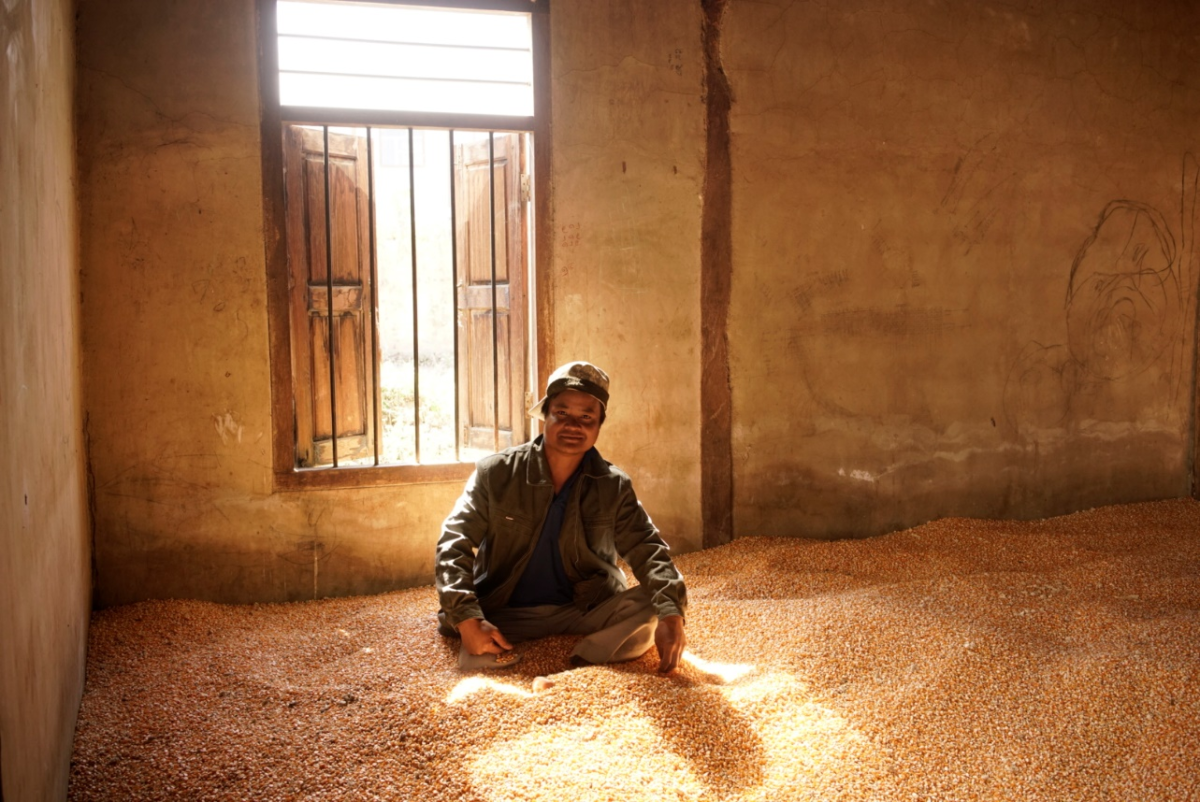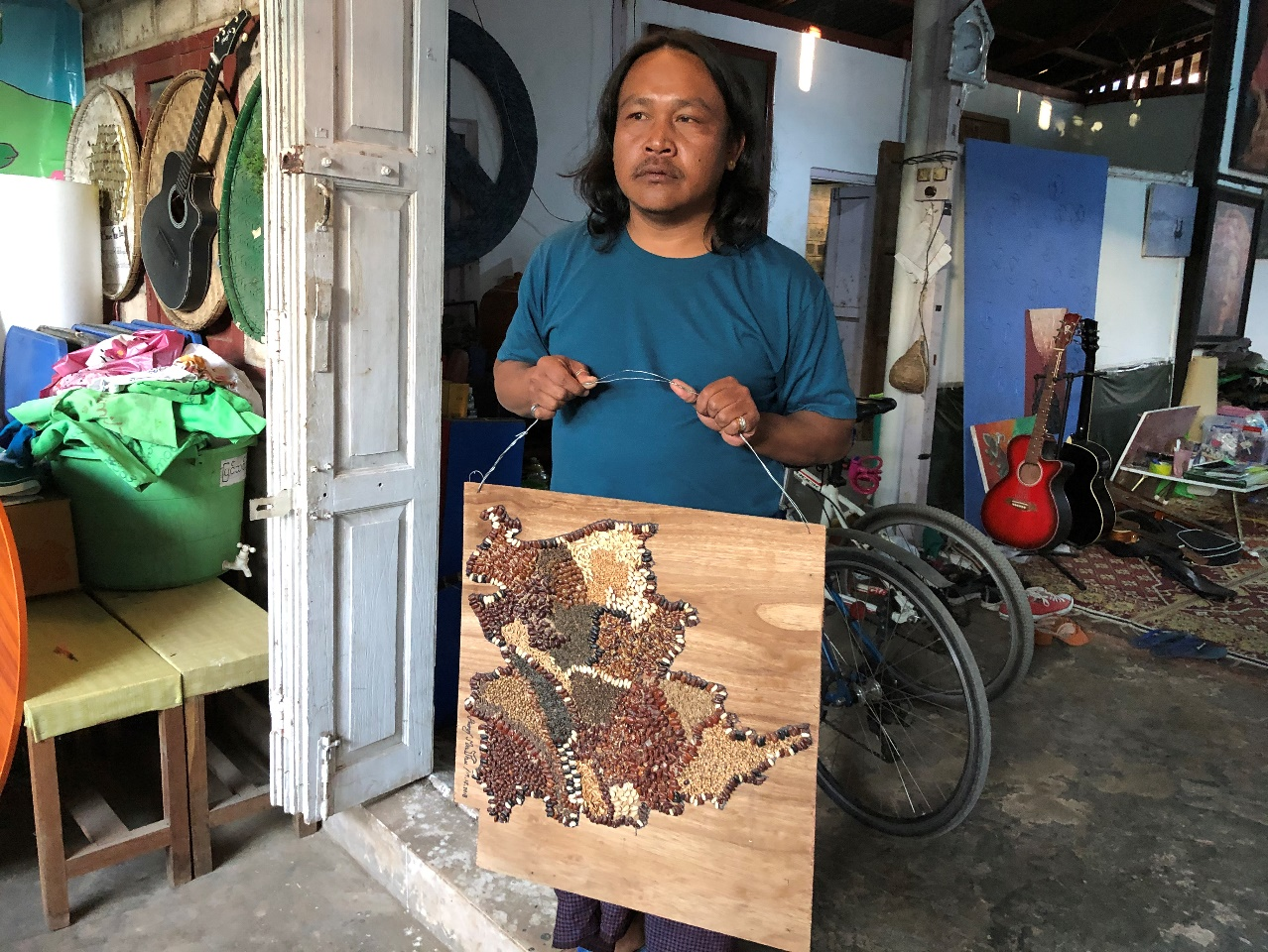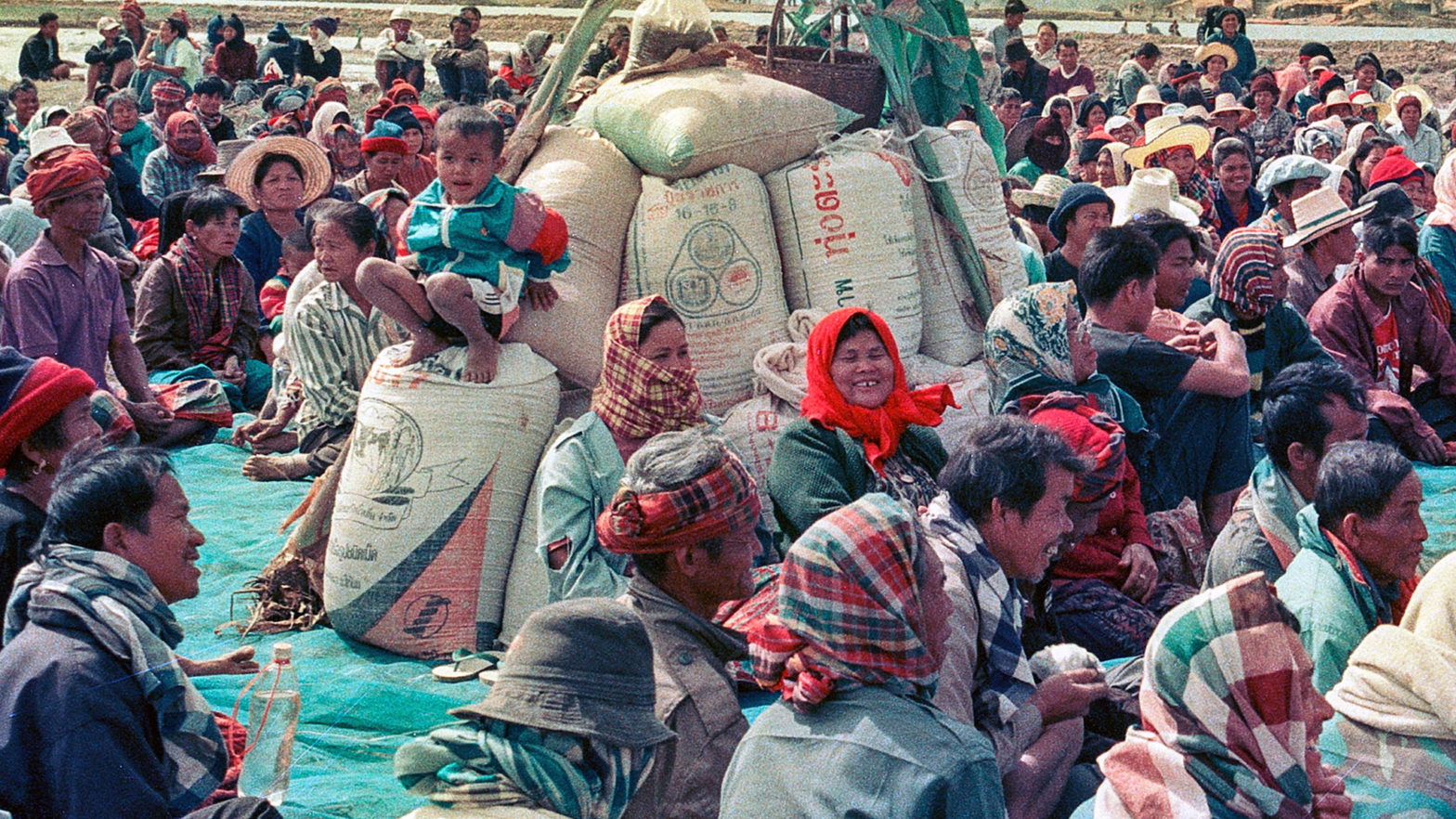This is the second story in a three-part Mekong Eye feature report exploring how contract farming in Myanmar’s Shan State is leaving poor farmers buried in debt and people in neighboring countries choking under smog. (read part 1) (read part 3)
As the rainy season gives way to winter, the fields of Shan State turn from green to gold with vast expanses of ripened maize, ready for harvest.
To an outsider this might appear to be a happy time for farmers, who stand to reap profits from their harvest. But Jor Saw, one of thousands of Pa-O ethnic maize farmers in Shan State, reveals dark reality.
“This is a very bad year for us all, because we suffered severe drought during this farming season, which not only reduced yields but also increased production costs as we had to spend more on water supplies and pesticides,” he said.
“Also, based on current market prices, we are likely to earn only about 400,000 kyat (US$285) per acre – barely enough to cover the loans we took from local maize brokers to purchase farming necessities. My family is bound to suffer.”
According to a 2018 report by farming platform Golden Paddy, cultivating one acre of maize costs US$455. That’s almost twice as much as contract farmers like Jor Saw now get for their crop. The inevitable outcome is a cycle of mounting debt, as farmers pay off their loans after the harvest only to borrow again to cover next season’s planting costs.
Exploitation in the contract farming system is a major reason for this crushing debt because, said Jor Saw, farmers are bound by local brokers and big agribusiness at every step of the way.
For instance, farmers under contract are forced to use hybrid seeds bought from seed companies. They are not allowed to collect seeds for replanting, which means the company can profit from selling seeds at the start of every farming season.
These commercial hybrid breeds also require intensive use of costly fertilisers, pesticides and herbicides in order to ensure a satisfactory yield, adding to contract farmers’ production costs.
Meanwhile, every interaction between farmers and companies is done through local brokers – middlemen who sell farming necessities to farmers and then purchase their maize harvest for resale to big companies. In the meantime, brokers provide loans to farmers to purchase raw materials at the start of the farming season, and then deduct the debt from farmers’ income after harvest.
“If the income from the harvest does not cover the debt, then it is added to what we will owe for the next farming season. This way, maize farmers’ debts grow larger and larger, until they get to a point where they can’t pay back and have no other choice than to give up their land to cover the debt,” he said.
Hence, lots of smallholder maize farmers in Shan State end up losing their land to local loan sharks.
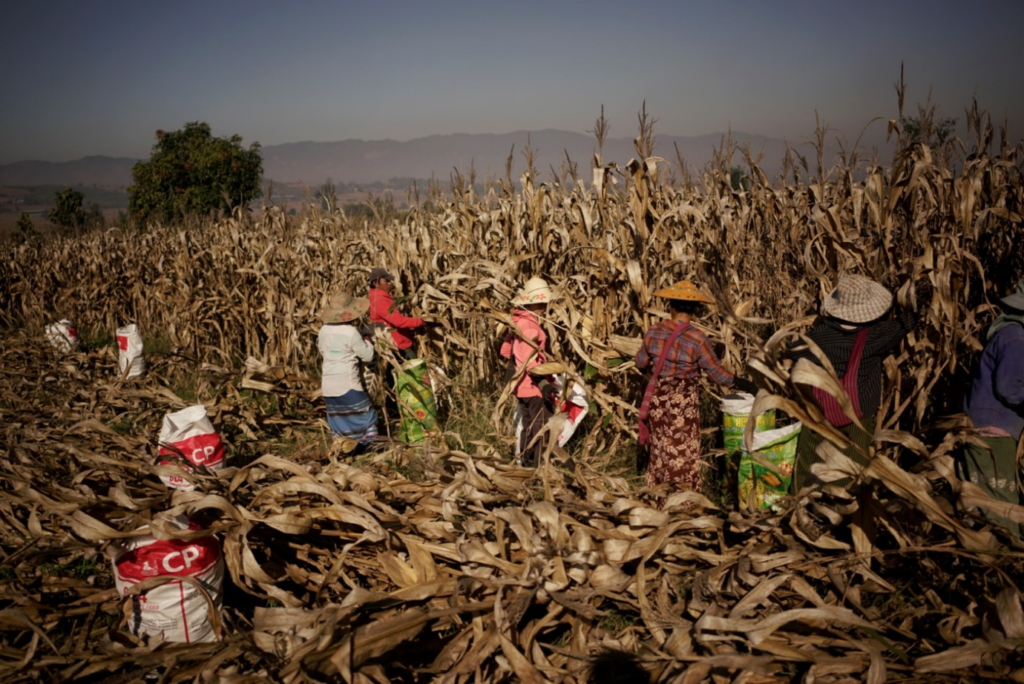
Many smallholder maize farmers in Shan State are drowning in debt. Photo by: Visarut Sankham
Environmental degradation deepening debt and inequality crisis
In Naung Dae, another Pa-O village in Taunggyi Township, maize farmer U Maung explained how environmental impacts from monoculture farming are aggravating the problems of debt and land dispossession.
The biggest problems plaguing maize farmers are deforestation, dropping soil fertility and degradation of ecosystems.
“All these maize fields were once lush forests but they were cut down eleven years ago to free more land to grow maize,” he said.
“In the first few years, the forest soil was fertile, contributing to great harvests. But later I began noticing that the soil was getting less fertile and productivity was declining every year. So, we had to rely more and more on fertilizers and chemicals to keep our farms productive.”
Although farmers suspect prolonged monoculture farming and chemical contamination are to blame for smaller harvests, they continue trying to solve this problem by using more chemicals and encroaching further into forests with the hope of regaining high yields, he said.
He added that deforestation and intensive use of agrochemicals have already taken a toll on the community, with dry soil becoming more common and food from the forest such as bamboo shoots, herbs and fish that locals used to gather, now more difficult to find and also dangerous to eat.
“The environmental impact of large-scale monoculture maize farming is affecting us badly. Not only have our farms’ productivity and our income reduced, our natural food sources have also disappeared forcing us to spend our limited income on buying food,” he said.
Jor Saw said this problem of overwhelming debt and land loss is also contributing to Thailand’s problem of illegal migrant workers, leading to serious human rights violations.
After losing everything and struggling to feed their families, many young people are forced to move to big cities or travel to Thailand so they can find a job and send money back home, while other landless farmers clear more forests to find new plots for farming, he said.
“I was one of those who crossed over to Thailand illegally. I worked there as a labourer for nearly ten years before returning home a few months ago,” Jor Saw said.
“Life [as a migrant worker in Thailand] was difficult and dangerous. Many of my friends were arrested for entering Thailand illegally, some became victims of human trafficking and were forced into labor. Yet, we have to take risks to feed our family.”
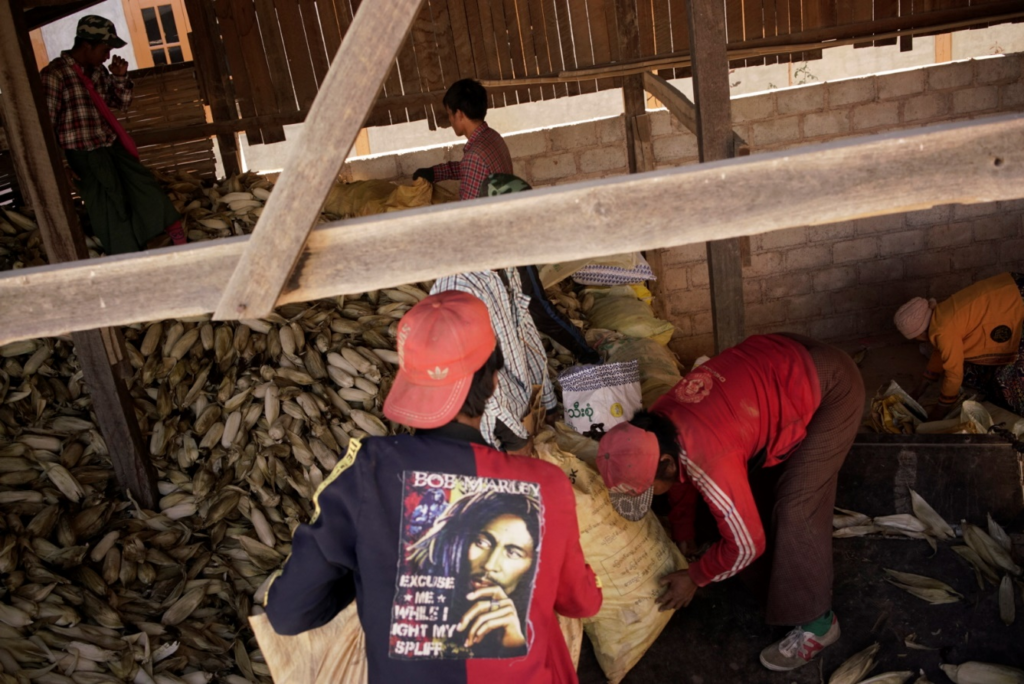
Workers pile up the maize harvest for sale to local brokers in Tha Yat Pin Hla Village, southern Shan State. Photo by: Visarut Sankham
Informal farming contracts allow exploitation
After learning first-hand how contract farming in Shan State is fueling financial hardship, degrading the environment and hurting communities, Witoon Lianchamroon, director of BioThai Foundation, agreed that farmers are being exploited by animal feed and agrochemical industries.
He said thanks to the informal nature of contract farming, maize farmers in both Thailand and its neighboring countries enter deals with giant animal feed companies via local brokers. Since they often don’t sign official documents, they are easily exploited or cheated.
“Unlike farmers of other cash crops, agroindustry companies generally do not deal with [maize] farmers directly. They usually position themselves as hybrid maize seed providers operating via local brokers, but in reality they are also the final destination of maize harvests,” he said.
“With this contract farming system, industrial maize and animal feed companies are able to easily evade responsibility for the adverse impacts maize contract farming is having on the environment and society.”
Witoon said the transnational animal feed industry makes big profits from this unfair contract system, but the agrochemical industry also benefits hugely because monoculture maize farming requires substantial amounts of chemical fertilisers, herbicides and pesticides.
Hence, he said, the agrochemical industry is also responsible for environmental degradation and serious debt among maize farmers.
The 2015 study “Opportunities, Risks and Growing Inequality: The Charoen Pokphand Group and Maize Smallholder Production in Shan State, Myanmar” by Kevin Woods reported that up to 99 pecent of maize contract farming investments in Myanmar were done informally through local brokers, so investors had no direct engagement with farmers.
In his study, Woods points out that the lack of formal contracts between companies and farmers allows investors to avoid taking responsibility for negative impacts stemming from their investments and also reduces farmers’ power to negotiate fairer farm-gate prices and production costs.
Wood stressed that farmers must rely totally on local brokers to survive – including for loans to cover farming costs – which gave local brokers the chance to exert greater power over farmers. Due to the lack of regulation, brokers can increase their interest rates while also reducing the price they pay for the maize, resulting in farmers being caught in the debt trap and eventually losing their land to these brokers.
In order to ease the socioeconomic impact on farmers in the maize contract system, Woods suggested that all stakeholders agree to ban the use of land as collateral for loans. This would force investors to sign formal contracts with farmers and give farmers access to appropriately regulated credit providers, cutting down their risks and guaranteeing profits from maize contract farming.
He also recommended that the government help establish farmer-led cooperatives and unions to boost their bargaining power while closely regulating maize investors to ensure their business operations meet international environmental and social standards.
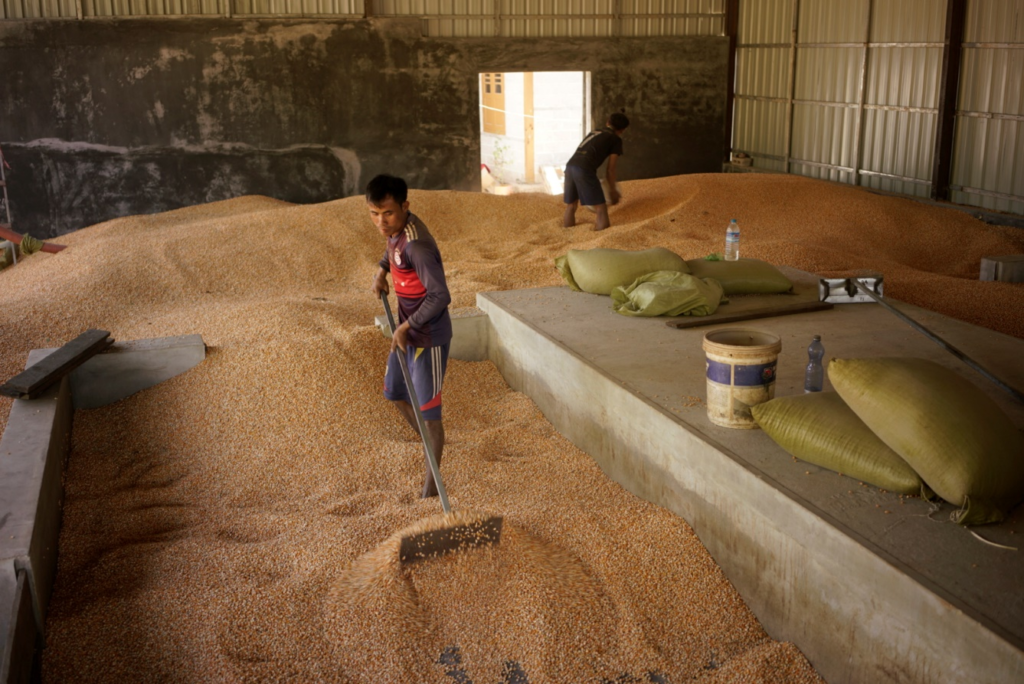
Maize produce is sorted in a local broker’s warehouse before it is resold to animal feed companies. Photo by: Visarut Sankham
Problems in Shan State trace back to Thailand
Tawan Hangsoongnern, president of the Foundation for Agricultural and Environmental Conservation (Thailand), said the expansion of industrial contract farming in Myanmar was mostly promoted by Thailand’s CP Group and its growing role in the region’s food industry. Hence, he said, all stakeholders in Thailand should take concrete action to improve sustainability and fairness in the transnational maize production supply chain.
Tawan said less than five percent of maize produce from Myanmar is officially imported to Thailand, but it is undeniable that a high proportion of maize produced using environmentally harmful methods under an unfair system is eventually entering the Thai market to meet high demand for the grain.
“Since the current demand for maize in Thailand stands at 7 million tonnes per year, and we can only produce 4 million tonnes, we have to find a large supply of cheap imported maize to keep our eggs and chicken affordable,” he said.
Although Thailand has set high standards for maize in its food supply chain, in reality maize grown using environmentally harmful methods can easily be smuggled into the Thai market from Myanmar, he said. Since most of the maize produced by contract farming is handled by at least three or four middlemen, it is impossible to trace its origins accurately.
“We cannot deny that Thai consumers benefit from large-scale contract farming in Myanmar and that we [Thais] are responsible for the environmental and social damage caused by unregulated contract farming,” he said.
Meanwhile, Witoon from BioThai Foundation said several case studies show that consumers have the power to improve flaws in contract farming, citing their influence over practices at palm-oil plantations in Indonesia.
However, the monopolistic nature of Thailand’s market, in which one agroindustry and animal feed giant controls much of the food and retail market, inevitably weakens Thai consumers’ power.
“About all we can do is raise questions about this unfair system, which is exploiting local farming communities and the environment in order to make big profits from our food supply chain,” he concluded.
The reporting for this feature series was made possible though funding provided by Earth Journalism Network.


